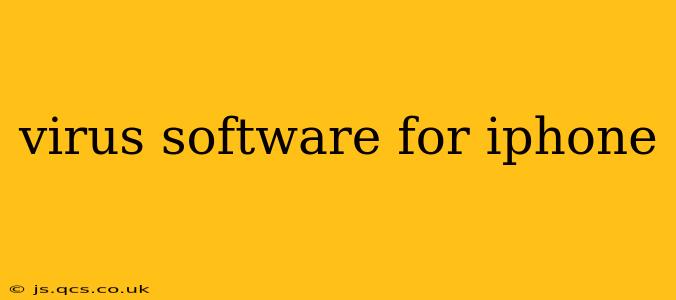The question of whether iPhones need virus software is a common one. While the iOS operating system is significantly more secure than many other operating systems, making it less susceptible to viruses and malware, it's not entirely invulnerable. This guide will explore the realities of iPhone security, address common concerns, and provide practical advice on protecting your device.
Do iPhones Need Antivirus Software?
The short answer is: generally, no. Apple's iOS operating system employs a robust security architecture that significantly mitigates the risk of virus infection compared to Android or Windows. This includes features like:
- App Store Vetting: Apps available on the App Store undergo a review process, reducing the likelihood of malicious software infiltrating your device.
- Sandboxing: Each app operates in its own isolated environment, limiting the damage a compromised app can inflict.
- Regular Security Updates: Apple regularly releases software updates that address security vulnerabilities and patch exploits.
However, it's crucial to understand that "no" doesn't equate to "completely safe." While full-blown viruses are rare, there are still potential threats:
- Phishing Scams: Malicious emails or text messages attempting to steal your personal information remain a significant risk.
- Fake Apps: Counterfeit apps, disguised as legitimate software, can appear outside the App Store and may contain malware.
- Jailbreaking: Modifying the iOS operating system through jailbreaking significantly increases your risk of infection, as it bypasses many of Apple's security measures.
What are the Best Practices for iPhone Security?
Instead of relying on antivirus software, focusing on these best practices is far more effective in protecting your iPhone:
- Download Apps Only from the App Store: This significantly reduces your exposure to malicious apps.
- Keep Your Software Updated: Regularly update your iOS and apps to benefit from the latest security patches.
- Enable Two-Factor Authentication: This adds an extra layer of security to your Apple ID and other online accounts.
- Be Wary of Suspicious Links and Emails: Avoid clicking on links from unknown senders or those that seem too good to be true.
- Use Strong Passwords: Create complex passwords for your Apple ID and other important accounts.
- Avoid Public Wi-Fi for Sensitive Transactions: Public Wi-Fi networks are often unsecured and can be easily intercepted.
Are There Any Antivirus Apps for iPhone?
While dedicated antivirus apps are not essential, some apps offer additional security features, such as VPN services for encrypting your internet traffic, or parental controls. However, choosing these apps carefully is crucial, as some may contain hidden malware or collect your personal data without your knowledge. Always research an app thoroughly before downloading it.
Does Apple Built-in Security Protect Against Viruses?
Yes, Apple incorporates several built-in security features to protect your iPhone from malicious software. These features, combined with user vigilance, are generally sufficient to maintain a high level of security. The emphasis should be on proactive measures rather than reactive antivirus solutions.
How Can I Check for Malware on My iPhone?
There isn't a standard malware scan like you'd find on a Windows or Android device. However, if you suspect your iPhone is compromised, look for unusual behavior such as:
- Unexpected high data usage: Malware may consume significant bandwidth.
- Battery drain: Malicious activity can rapidly deplete your battery life.
- Slow performance: Malware can slow down your device's performance.
- Pop-up ads: Excessive pop-up advertisements are a warning sign.
If you notice any of these, restart your device and review your recently installed apps. If the problem persists, contact Apple Support.
Conclusion: Proactive Security is Key for iPhones
In conclusion, while the possibility of a virus infecting your iPhone is minimal, it's not zero. By adhering to secure practices and being vigilant against phishing scams and counterfeit apps, you can effectively protect your device without relying on traditional antivirus software. Regular software updates and a cautious approach to app downloads remain the most effective strategies for maintaining a secure iPhone experience.
